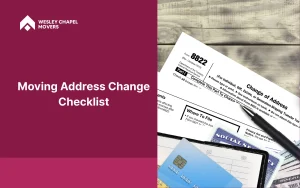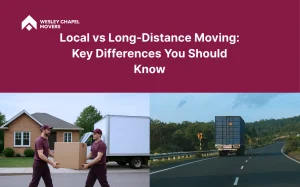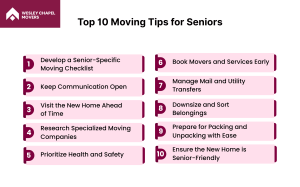The cost of hiring movers ranges from $450 to $10,500, depending on factors like distance, load size, service level, and location. Movers generally charge between $80 and $200 per hour per mover, depending on the type of move, such as local, long-distance, residential or commercial.
Additionally, regional demand, seasonal fluctuations, hidden fees, and insurance options can all impact the final cost. While pricing varies depending on these aspects, different moving companies use models such as hourly rates, flat fees, binding quotes, and non-binding estimates.
Understanding these factors helps you budget more effectively, compare quotes, and make informed decisions about whether hiring movers is the best choice or if an alternative moving solution might work better for you.
What Are the Average Moving Costs by Type?
The cost of hiring movers ranges from $450 to $2,500 for local moves and $2,200 to $10,000+ for long-distance moves. Local moves (under 50-100 miles) are generally cheaper than long-distance moves (over 100 miles or crossing state lines), while commercial moves tend to be more expensive due to specialized equipment and extra labor.
Residential Moves
The average cost of residential moves ranges from $1,000 to $5,000+ for local moves, and $2,200 to $10,500+ for long-distance moves. The total cost depends on factors such as home size, distance, and additional services like packing, unpacking, and special handling.
| Home Size | Local Move Range | Long Distance Range |
| 1 Bedroom | $1,000 – $1,800 | $2,200 – $4,500 |
| 2 Bedroom | $1,500 – $2,500 | $3,500 – $6,500 |
| 3+ Bedroom | $2,000 – $5,000+ | $5,000 – $10,500+ |
Commercial Moves
A commercial move, also referred to as business relocation, on average costs anywhere between $1,000 to $10,000+ for local moves and $3,000 to $15,000+ for long-distance moves. Costs are influenced by office size, IT equipment handling, heavy machinery transport, location, and downtime.
| Office Size | Local Move Range | Long Distance Range | Avg. Crew Size |
| Small | $1,000 – $2,500 | $3,000 – $6,000 | 3-5 movers |
| Medium | $2,500 – $5,000 | $5,000 – $10,000 | 5-8 movers |
| Large | $5,000 – $10,000+ | $8,000 – $15,000+ | 8-12 movers |
Local Moves
A local move costs between $450 and $2,500, depending on the size of the home and distance (usually 50-100 miles). Most local movers charge hourly, with a minimum requirement of 2-4 hours. Traffic conditions, building access, and the total labor hours can all affect the final price.
| Home Size | Typical Cost Range | Average Hourly Rate (Per Mover) |
| Studio | $450 – $1,200 | $80 – $100 |
| 1 Bedroom | $1,000 – $1,800 | $90 – $120 |
| 2 Bedroom | $1,500 – $2,500 | $100 – $150 |
Long-Distance Moves
The average cost of a long-distance move ranges from $2,200 to $10,500+, depending on distance and the size of the home. These moves generally cover distances over 100 miles or involve crossing state lines. The cost is often based on weight or a flat rate, with additional charges for fuel, tolls, and overnight stays on long routes.
| Distance Range | Cost for 1-2 Bedrooms | Cost for 3+ Bedrooms |
| 100-500 miles | $2,200 – $4,000 | $3,500 – $6,000 |
| 500-1,000 miles | $3,000 – $6,000 | $5,000 – $8,000 |
| Cross-country | $4,500 – $7,500+ | $7,000 – $10,500+ |
What Are the Different Pricing Models for Movers?
The different pricing models for movers include hourly rates, flat rates, binding quotes, and non-binding estimates. In the moving industry, a pricing model refers to the way moving companies charge for their services. Therefore, understanding these different pricing models is important as they will help you determine the overall price and avoid surprises.
Hourly Rate
Hourly rate pricing on average costs anywhere between $80 and $200 per mover, making hourly rate pricing most common for local or short-distance moves. This model charges a set fee based on the number of movers and the time spent on the job. However, the total cost can vary depending on factors such as region, traffic, building access, and labor speed.
| Region (US) | 2 Movers (Hourly) | 3 Movers (Hourly) | Average Total (2-3 Hour Move) |
| Northeast | $110 – $160 | $150 – $210 | $190 – $260 |
| Midwest | $90 – $140 | $130 – $190 | $170 – $240 |
| West Coast | $120 – $170 | $160 – $220 | $200 – $280 |
| South | $80 – $130 | $120 – $180 | $160 – $220 |
Flat Rate
The average flat rate for movers ranges from $1,000 to $4,500+, depending on the distance, size, and complexity of the move. Flat rate pricing is commonly used for long-distance or fixed-scope moves. The moving company calculates the price based on the estimated time, distance, and labor involved. This price is agreed upon before the move, offering cost certainty. The main benefit of this model is predictable pricing, but it can lead to overpayment if the job is completed faster than expected.
| Move Type | Flat Rate Estimate | Estimated Hourly Cost |
| 1 Bedroom (50 miles) | $1,000 | $950 – $1,150 |
| 2 Bedroom (100 miles) | $2,200 | $2,100 – $2,400 |
| 3 Bedroom (250 miles) | $4,500 | $4,300 – $4,800 |
Binding Quote
A binding quote is a fixed price that the moving company guarantees, no matter what changes during the move. This approach gives customers budget certainty and peace of mind, as they know exactly what they will be paying. The advantage of a binding quote is its certainty, but the risk comes in if additional items are added after the agreement is made. Therefore, if the scope changes, you may need to negotiate a new price.
| Move Type | Binding Quote Estimate | Actual Cost Without Binding |
| 1 Bedroom (200 miles) | $2,000 | $1,850 – $2,200 |
| 3 Bedroom (1,000 miles) | $6,800 | $6,500 – $7,300 |
| Office (5,000 sq. ft., 50 miles) | $5,500 | $5,200 – $5,900 |
Non-Binding Estimate
The average cost for a non-binding estimate ranges from $600 to $8,000+, depending on the size and distance of the move. The main benefit of this pricing model is its flexibility, as the estimate is based on initial assumptions and can be adjusted if needed. However, it can lead to unexpected costs if the job takes longer than expected or requires additional resources. To avoid surprises, it is important to clarify the time frame and any potential extra charges upfront with your mover.
| Move Type | Initial Estimate | Final Cost |
| Studio (20 miles) | $600 | $680 |
| 2 Bedroom (300 miles) | $2,800 | $3,150 |
| 3 Bedroom (cross-country) | $7,200 | $8,050 |
What Hidden Moving Costs Should You Watch Out For?
Hidden moving costs can include fuel and mileage fees, stairs and long-carry charges, special handling fees, and seasonal surcharges. These fees are often excluded from initial quotes but can significantly affect your total cost. Be sure to ask about them upfront to avoid surprises and better plan your move.
Fuel and Mileage Fees
Fuel and mileage fees cover the cost of operating the moving truck, usually charged per mile for long-distance moves or as a flat fee for local moves. These fees can vary depending on the region, so it is important to confirm them when requesting quotes to avoid unexpected charges.
Stairs and Long-Carry Charges
If movers need to carry items up multiple flights of stairs or cover a long distance (over 75 feet) between the truck and the entrance, extra charges may apply. These fees reflect the added labor required and can vary depending on building access and layout.
Special Handling Fees
Moving fragile, oversized, or high-value items like pianos, antiques, or fine art often incurs additional costs known as special handling fees. These cover extra packing materials, protective crating, and sometimes even additional movers to ensure the safe transport of your belongings.
Insurance & Liability
Insurance options like Full Value Protection offer coverage for lost or damaged items during the move, providing peace of mind. While Released Value Protection is often provided at no extra charge, it offers minimal coverage. For more comprehensive protection, especially for valuable items, Full Value Protection is recommended.
How Do Moving Costs Change by Region or Season?
Moving costs vary by region and season due to factors like labor rates, demand, and access challenges. Urban areas have higher rates because of increased labor costs, parking restrictions, and higher demand. Regional differences in the cost of living and local regulations can also affect pricing.
Seasonal demand plays a significant role, with peak season (from May to September) seeing higher rates due to limited availability and high demand for movers. In contrast, off-peak seasons (like fall and winter) often have lower rates because of reduced demand.
| Region/Period | Cost Range for 2 Bedroom Move |
| Urban (Summer Peak) | $2,500 – $4,500 |
| Suburban (Summer Peak) | $1,800 – $3,500 |
| Urban (Off-Peak) | $2,000 – $3,800 |
| Suburban (Off-Peak) | $1,200 – $2,800 |
Urban Pricing
The cost of moving in urban areas ranges from $1,200 to $3,000. Factors like higher labor costs, parking restrictions, and increased demand contribute to these higher rates. Larger cities with a higher cost of living often result in more expensive moving services. Additional fees may apply for truck access in urban areas, and permits could be required for moving large items. In cities with dense traffic and limited access for large trucks, expect extra charges for maneuvering and parking, which can further increase overall costs.
Regional Differences
Moving costs vary by state, province, or metropolitan area, influenced by factors like labor rates, local regulations, and cost of living. In competitive markets, movers may lower rates, while smaller areas with less competition tend to have higher prices. High-demand urban areas like New York or San Francisco often have significantly higher rates due to limited availability and local regulations.
| Region | Estimated Cost for 2 Bedroom Move |
| Northeast (Urban) | $2,500 – $4,500 |
| Midwest (Suburban) | $1,800 – $3,200 |
| West Coast (Urban) | $3,000 – $5,500 |
International Moves and Currency Rates
International moves involve cross-border relocations requiring additional logistics and customs clearance. The final cost of international moves is also affected by currency exchange rates, as a strong destination currency can increase costs, while a weaker one can lower them. Currency fluctuations must be taken into account when estimating international move costs. Before committing to an international move, it is essential to understand both the logistics involved and how currency fluctuations can influence the overall cost.
| Destination Country | Estimated Cost for Standard 3 Bedroom Move | Currency Impact |
| UK (Strong Pound) | $5,000 – $8,000 | Higher due to exchange rate |
| Mexico (Weak Peso) | $4,000 – $6,500 | Lower due to exchange rate |
| Australia (Strong Dollar) | $5,500 – $9,000 | Higher due to exchange rate |
Peak-Season Rates
The moving cost during the peak-season can be anywhere between $2,500 – $4,500 for 2 bedrooms. During high-demand months, often between May and September, movers have less availability and more bookings. As a result, moving companies increase their rates due to increased demand for services. To avoid high peak-season rates, consider booking your move during the off-peak months when moving demand is lower, in fall or winter.
| Season/Period | Average Cost (2 Bedroom) |
| Peak Season (Summer) | $2,500 – $4,500 |
| Off-Peak Season (Winter) | $1,500 – $3,000 |
Weekday and Weekend Rates
Weekend moving costs are 15-25% higher than weekday rates due to higher demand and limited crew availability. Weekday moves are generally more affordable, and some moving companies even offer mid-week specials for customers who are flexible with their schedule. For a 2-bedroom move, weekend costs range from $2,200 to $4,000, while weekday moves cost between $1,800 and $3,500.
How Much Do Movers Charge by Size or Scale?
For moving a studio apartment, movers can charge between $450 and $2,500, while larger commercial moves can cost $3,000 to $20,000+. The cost varies based on factors like the number of rooms, square footage, and quantity of items. Larger moves require more movers, longer labor hours, and larger vehicles, driving up the overall cost. Additional charges may apply for special handling, access challenges, or extra services like packing.
Studio or Small Apartment
The cost of moving a studio or small apartment ranges from $450 to $1,200 for local moves and $1,800 to $2,500 for long-distance moves. A studio or small apartment usually consists of 1-2 rooms and minimal furniture, making these moves quicker and more affordable. They require only 3-5 hours of labor and only 2 movers.
One-Bedroom Apartment
A one-bedroom apartment ranges from 600-900 sq. ft. and costs anywhere from $1,000 to $1,800 for local moves and $2,200 to $4,500 for long-distance moves. These moves require more effort than a studio, involving packing and moving larger furniture and possibly fragile items. Typically, 4-6 hours of labor and a crew size of 2-3 movers are needed.
Two-Bedroom Apartment
The average cost of moving a two-bedroom apartment ranges from $1,500 to $2,500 for local moves and $3,000 to $6,500 for long-distance moves. These moves generally involve 900-1,200 sq. ft. of space and include larger furniture and more household items. They often require more movers, additional time, and sometimes extra packing services for large or fragile items. Specialty items like large furniture or delicate electronics can increase the total cost. Generally, it requires 5-8 hours of labor and 3 movers to complete the move.
Three-Bedroom or Larger Home
A three-bedroom or larger home is 1,200+ sq. ft., and costs anywhere from $2,000 to $5,000+ for local moves and $5,000 to $10,500+ for long-distance moves. These moves often involve multiple floors, heavy furniture, and more complex logistics, requiring a larger crew of 4-6 movers, and 8-12 hours, especially for packing, loading, and unloading. Specialty handling for large items like pianos or safes can further increase the cost.
Small Office or Retail Space
The cost of moving a small office or retail space (under 1,500 sq. ft.) ranges from $1,000 to $3,000+ for local moves and $3,500 to $8,000+ for long-distance moves. These moves generally involve 3-4 movers and require 5-8 hours of labor. They include basic office furniture, equipment, and retail displays, with special handling needed for IT systems and technology. IT equipment handling and downtime costs should be factored into the quote, especially if the business cannot afford disruptions.
Large Office or Warehouse
The cost of a large commercial move ranges from $3,000 to $8,000+ for local moves and $8,000 to $20,000+ for long-distance moves. These moves are more complex, involving heavy machinery, specialized equipment, and larger crews. They often require 10-16 hours of labor with a crew size of 6-12 movers. The complexity of handling large items, specialized tools, and potential downtime during the move can significantly impact the final price.
How Much Do Full-Service Packages Cost?
A full-service moving package costs somewhere between $720-$5,000 or even more. This package includes everything from packing and transportation to unpacking and setup. These services significantly increase the total moving cost due to the additional labor, materials, and time involved.
While the cost may seem a bit high at a glance, these services provide convenience and reduce stress. Especially for those who have limited time, high-value belongings, or physical constraints.
Professional Packing Services
Professional packing services cost $200 to $1,000+, depending on the size of the home or office and the amount of packing required. With this package, trained movers use appropriate materials, such as bubble wrap, moving blankets, and boxes, to pack household or office items. This reduces the risk of damage to fragile items and ensures a more efficient, faster move.
| Home Size | Cost Range |
| Studio/Small Apt | $200 – $500 |
| 1 Bedroom Apt | $300 – $600 |
| 2 Bedroom Apt | $500 – $1,000 |
| 3+ Bedroom Home | $1,000+ |
Furniture Disassembly and Assembly
The furniture disassembly and assembly services cost between $50 and $250, depending on the item. This service involves taking apart large furniture (like beds, wardrobes, and desks) for easier transport and then reassembling it at the new location. It helps prevent damage during the move and saves time.
| Item Type | Cost Range for Disassembly & Assembly |
| Bed (Queen/King) | $50 – $150 |
| Wardrobe | $75 – $200 |
| Modular Desk | $100 – $250 |
Unpacking and Setup
The cost of unpacking and setup services ranges from $100 to $1,400+, with an extra add-on of $50 – $200+, depending on the level of assistance needed. This service includes unpacking items, setting them up in the new space, and removing all packing materials. It helps reduce post-move stress, particularly for those who are busy or have many items to manage. Same-day unpacking incurs a premium cost due to the additional labor required to complete the job quickly.
| Service Type | Cost Range |
| Basic Unpacking | $100 – $400 |
| Full-Service Unpacking | $500 – $1,400+ |
| Additional Services (eg, furniture assembly) | $50 – $200+ |
What Insurance and Liability Coverage Do Movers Offer?
Movers offer three main types of insurance and liability coverage, including Full Value Protection, Released Value Protection, and Third-Party Coverage. These protections help safeguard you from financial loss if your items are damaged, lost, or stolen during the move.
Full Value Protection
When choosing Full Value Protection, your items are covered for their replacement value if lost, stolen, or damaged. This option provides repair, replacement, or a cash settlement for the damaged item’s value. However, it often requires a detailed inventory of your items before the move and comes with higher costs.
| Declared Value (per $1,000) | Typical Cost | Coverage Conditions |
| $1,000 | $10 – $15 | Full replacement value, including repair, replacement, or cash settlement |
| $5,000 | $50 – $75 | Full coverage with higher limits |
| $10,000 | $100 – $150 | Full coverage, often with detailed inventory documentation required |
Released Value Protection
Although Released Value Protection is often included at no extra charge, it provides minimal coverage, limited to $0.60 per pound. This basic insurance is automatically offered by most moving companies but is insufficient for high-value or fragile items, offering only minimal reimbursement for damages.
| Item Type | Weight | Payout ($0.60 per lb) |
| Sofa (100 lbs) | 100 lbs | $60 |
| TV (40 lbs) | 40 lbs | $24 |
| Computer (15 lbs) | 15 lbs | $9 |
Third-Party Coverage
Purchased from an external insurer, third-party coverage fills gaps in the mover’s liability, offering broader protection, faster claims processing, and often higher coverage limits than the mover’s policy. However, coordination between the mover and insurer is necessary if a claim arises. It is crucial to ensure the insurance covers specific items or situations that the mover’s policy may not include.
| Coverage Limit | Premium (per $1,000) | Typical Coverage |
| $1,000 | $10-$20 | Covers gaps in mover’s liability |
| $5,000 | $50 – $100 | Extended coverage for high-value items |
| $10,000 | $100 – $150 | Comprehensive coverage, including third-party claims |
Consumer Rights and Claim Process
As a customer, you have specific rights under federal and state regulations regarding mover liability and claims. If items are damaged or lost during your move, you can file a compensation claim. The process follows these steps:
- Document Damage: Take clear photos and notes of any damaged or lost items.
- Submit a Claim Form: Contact your mover or insurance provider and submit the necessary paperwork.
- Provide Proof: Provide receipts, inventory lists, or appraisals to back up your claim.
- Await Resolution: Wait for the mover or insurance company to assess and resolve the claim.
Common Deadlines:
- Must file within 9 months of delivery for damages under the FMCSA regulations.
- Claims for lost items need to be filed within 30-60 days of the move.
Tip: Before booking, always check the FMCSA regulations (for interstate moves) and your local regulations to ensure you understand your rights and deadlines for filing claims.
What Are the Alternatives to Hiring Movers?
The alternatives to hiring movers are DIY moving, rental trucks with labor, and moving container services, each offering more cost-effectiveness and flexibility. Depending on your budget, physical ability, and timeline, some alternatives may be better suited to your needs.
| Alternative Option | Pros | Cons |
| DIY Moving | Lover cost, full control | High physical labor, time-consuming |
| Rental Truck with Labor | Reduced physical strain, flexible schedule | Coordination required, rental fees |
| Moving Container Services | Flexible loading, secure storage | Potential neighborhood access issues, costs vary by distance |
DIY Moving
A move that requires handling everything yourself, from packing and loading to transporting and unloading, is called DIY moving. In this option, you rent a truck and manage all tasks without professional help. While it offers cost savings and complete control over the process, it also demands significant physical labor, a time investment, and carries the risk of damaging your belongings if not handled carefully.
| Cost Type | Estimated Range |
| Truck Rental (1 day) | $30 – $100 |
| Fuel | $50 – $150 |
| Equipment (Dollies, pads) | $10 – $50 |
| Total (Local Move) | $150 – $300 |
Rental Truck with Labor
On average, a rental truck with labor ranges anywhere between $100 and $4,000, depending on the distance and number of laborers. With this option, you rent a moving truck but hire laborers to help with loading and unloading. This approach strikes a balance between DIY and full-service movers, offering reduced physical strain and flexible scheduling.
| Cost Type | Estimated Range (Local Move) | Estimated Range (Long-Distance Move) |
| Truck Rental (1 day) | $30 – $100 | $100 – 200 |
| Labor (per hour) | $25 – $40 per mover | $25 – $50 per mover |
| Total (Local Move) | $300 – $600 | $500 – $1,000+ |
Moving Container Services
Moving container services cost $225 to $600+ for local moves and $1,000 to $9,000+ for long-distance moves, depending on factors like the move size and distance. This service involves a moving company delivering a storage container to your location, which you then load at your own pace. Once the container is packed, the company transports it to your new home.
| Type of Move | Local Rental Price | Long-Distance Rental Price |
| 1 Bedroom | $225 – $600+ | $1,000 – $4,500 |
| 2-3 Bedroom | $450 – $820+ | $1,500 – $7,500 |
| 4+ Bedroom | $600 – $1,000 | $3,000 – $9,000+ |
Choosing the Right Option for Your Needs
When choosing the right moving option, always be sure to compare multiple quotes, taking into account hidden costs like fuel, tolls, or storage fees, to ensure you make the most cost-effective decision. In addition, here are certain factors you must be aware of when choosing the best alternative to hiring movers:
- Budget: DIY moving is the most cost-effective, while full-service options are the most expensive.
- Distance: Long-distance moves may make moving container services or rental trucks more cost-effective compared to full-service movers.
- Physical Ability: DIY moving requires a lot of physical labor, so if you have physical constraints, rental trucks with labor or moving containers may be better options.
- Timeline: If you have limited time, full-service movers offer convenience, but rental trucks with labor and moving containers offer more flexibility in terms of timing.
How Can You Budget and Plan Your Moving Expenses?
To budget and plan your moving expenses, try using a cost calculator, creating a proper budget template, and using available cost-saving tips. The key to effective planning is understanding all the potential costs involved and creating a system to track and adjust for them.
Using Cost Calculators
Moving cost calculators are available online that will help you estimate expenses based on key factors such as distance, move size, and service level. To use the cost calculator for your specific need, you can just search “Moving Cost Calculator” on the internet, and different options will be available. They provide a helpful ballpark figure for how much your move might cost, allowing you to plan.
When using these calculators, make sure you input all the details correctly, including the number of items and special requirements (e.g., fragile items) for accurate estimation. You can also use multiple calculators to cross-check your results.
Creating a Budget Template
A budget template is an essential tool that helps you break down the costs into categories and stay organized. Your template should include columns for estimated cost, actual cost, and the variance between the two, so you can easily track where you are overspending or underbudgeting. Additionally, a good budget template should also include space for hidden or contingency expenses, such as unexpected charges for stairs, long carries, or extra packing materials.
Here is an example of a simple budget template:
| Expense Category | Estimated Cost | Actual Cost | Variance |
| Packing Materials | $100 | $120 | +$20 |
| Truck Rental | $250 | $230 | -$20 |
| Labor (2 movers) | $300 | $350 | +50 |
| Fuel | $50 | $60 | +10 |
| Special Handling | $150 | $150 | $0 |
| Total | $850 | $910 | +60 |
Cost-Saving Tips
By prioritizing actions that offer the biggest savings with minimal inconvenience (like decluttering or booking off-peak), you can lower the overall cost of your move. Here are some proven strategies to help you cut moving costs while maintaining convenience:
- Declutter before the move: The fewer items you have, the less you will need to move, and the lower your moving costs will be.
- Book during off-peak seasons: Moving during winter or early spring (when demand is lower) can save you money.
- Compare multiple quotes: Get quotes from at least 3-4 moving companies to ensure you get the best price.
- Provide packing materials: Instead of paying for the mover’s packing supplies, purchase boxes, bubble wrap, and tape.
- Choose a smaller crew (if feasible): If you have fewer items, hiring fewer movers can reduce labor costs.
How Can You Get and Compare Moving Quotes?
To get and compare moving quotes, contact at least 3-5 moving companies for written estimates. Make sure to include details like move date, locations, inventory, and special items. Ask key questions about experience, insurance, and handling of special items. Negotiate terms and verify the company’s licenses to avoid scams. Comparing multiple quotes helps ensure fair pricing and reliable service. The more information you gather, the better equipped you will be to make an informed decision.
Requesting Quotes
To get accurate and detailed moving estimates, you should contact at least 3-5 movers. Make sure to request written estimates, as this will protect you in case of disputes later. When requesting a free quote, be sure to include the following details:
- Move date: Specify when the move will take place.
- Pick-up and delivery locations: Provide the addresses to get an accurate estimate of travel time and distance.
- Inventory list: Provide a detailed list of items you need moved, including furniture, appliances, and fragile items.
- Special items: Include any items that may require special handling, like pianos or artwork.
- Service level: Mention if you need packing, unpacking, or full-service moving.
Getting detailed written estimates ensures transparency and helps you avoid unexpected costs. Requesting multiple quotes allows you to compare prices and services before making your final decision. If you are ready to get started, you can get a Free Quote from our trusted moving service today!
Questions to Ask Before Hiring
Before hiring a moving company, it is important to ask key questions to ensure that the company meets your needs and is reliable. By asking questions related to their experience and insurance policy beforehand helps you to get clear answers that reduce the risk of miscommunication and unexpected charges, ensuring a smoother moving experience. Some questions to ask before hiring are:
- How much experience do you have with similar moves?
- Are you insured?
- How do you handle special items?
- What is your cancellation policy?
- What are the final payment terms?
Negotiating with Movers
To secure better rates and terms, it is important to be strategic in your negotiations. Here are a few tips for successful discussions:
- Let movers know that you are getting quotes from multiple companies to see if they can offer a more competitive rate.
- Many movers offer lower rates on weekdays or during non-peak seasons (fall or winter).
- If you need additional services (like packing), see if you can bundle them with your move for a discount.
- If the company charges extra for things like stairs or long carries, ask if they can waive these fees.
Tip: Be polite but firm in your negotiations. Once you have agreed on terms, make sure to document everything in writing to avoid misunderstandings.
Verifying Licenses and Avoiding Scams
To avoid scam, fraud, financial loss, and ensure you are hiring a legitimate moving company, it is crucial to verify their credentials. You can do this by checking with the following:
- FMCSA (Federal Motor Carrier Safety Administration): Use the FMCSA database to check if the mover is registered and has the proper licensing for interstate moves.
- State licensing boards: For local moves, verify the mover’s credentials with your state’s licensing board.
- Local business registries: Ensure the company has a valid physical address and proper registration with local authorities.
Red flags to watch for include:
- Cash-only payments: Legitimate companies will accept multiple forms of payment, not just cash.
- No physical address: Movers without a business address may be untrustworthy.
- Unmarked trucks: Avoid movers who show up with unmarked or poorly maintained vehicles.
- Vague contracts: Make sure the contract is detailed and clearly outlines all charges and services.







